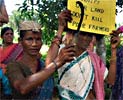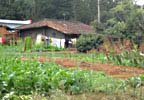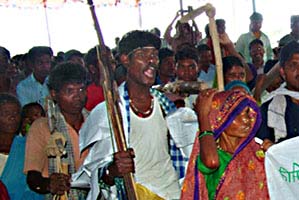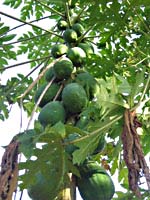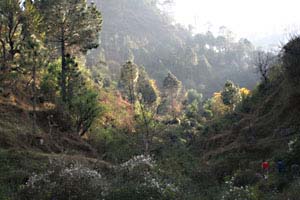Sitting on the Fence
Letter from a Middle Class Activist
Dear Manoj,
You wrote: "... the middle class activists who are often sitting on the fence and do not take time in getting into their holes when the struggle of the oppressed takes a tough posture."
It is a terrible idea that we, middle class activists, sit at the fence, when 'our people', the small farmers, are killed by the government. Killed by decades old exploitation, by displacement for mining and so many other projects and now killed as collateral damage for hunting the 'Maoists'. At the same time we are sitting on the fence, doing almost nothing. Traveling, having some discussions, writing an article, making a picture, compiling a website.
What can we, middle class activists, do?
In theory we can go there, become a guerilla, fight together with the Adivasi farmers and perhaps die with them. But not me. I don't see myself taking a gun and trying to kill an enemy. That is not how I am. It is not because I am against armed struggle in principal. Contrarily, when the powerful are completely deaf and blind for needs of the poor, it is better to use violence than to let you exterminate quietly. Sometimes violence is the only way to show the powerful you are there and you have your dignity and your rights. It is the violence to restore the communication, when nothing else helps.
I know violence is corrupting fast, even well meaning people. I know that a violent movement, even with the nicest dreams, attracts people who enjoy violence, in fact: criminals. War violence, also of people with the right ambitions, causes traumas. It can takes decades, perhaps three generations, to overcome these traumas. I know. But sometimes the violence of the state and the companies is so big, the people decide to defense themselves. In that situation they are right.
But when you are a middle class activist like you and me, and you are not a soldier. What else can we do?
What is the problem?
The powerful don't take care of the poor. They need the land of the poor to sell it to mining companies, dam constructors or the timber mafia. The poor are waste-people, redundant. And they are troublesome, because they don't want to cooperate. So, it is time to show them who is the boss. The people will be displaced to open camp villages, the land will be sold, or rented out, and the troublemakers will be killed. Then the money will flow.
What is the solution?
The small farmers want in the first place to be left in peace, so that they can live their own life without any 'help' from the government; without the police officers who make problems every day; without other officials who are looking for kickbacks all the time. In the second place they want a piece of land for every family, so that everyone can grow its own food and a little more to sell for cash. In the third place village democracy, so that they can make their own decisions together with all the villagers. Without pressure from outside bureaucrats or company people, and without pressure from inside from the village elite. In the fourth place they want support to establish a good level of medical help and education in the village. And some initiatives to boost the local village economy.
What can we, middle class activists, do?
We can explain the middle class in the cities, and in the West, what is going on. How poor village people are exploited already so
many decades. How the situation is becoming worse, how the hunger is growing. But also that the resistance is there and that it is growing
too. Not only rallies, slogans and road blocks. But also armed struggle. Because the poverty is too terrible.
We have to explain that there is a lot of violence. In the first place the violence of the system of exploitation. In the second
place the violence of the soldiers and policemen. And in the third place the violence of self defense of the poor farmers, the Adivasis. Fighting
for their rights, for their survival. More violence of the state will bring more counter violence of the rural poor. Because more and more of them
realize, they don't have to lose anything any longer. Now they fight for their dignity.
But first we have to visit the villages ourselves, to hear the stories of poverty, hunger, oppression. And of resistance and hope. To see
the daily village life. To make pictures and video clippings and have discussions. To establish friendly relationships.
Then we can write articles, make documentaries and websites. In the cities and in the West we can organise information and discussion
meetings and form support groups.
We have to make it clear for the middle class we will never win this battle. Because the Adivasis have their history of struggling for more than hundred years. The police and the army forces can become bigger and bigger. But small groups of guerillas well motivated to fight for autonomy will attack them. They will bring stress and demoralisation to soldiers who are fighting for money only, as a job. In the end the mining companies and others will not be safe.
We have to explain the middle class that there is a need for a compromise. For the sake of the poor Adivasi farmers but also for the middle class itself. Because the violence is there, it is growing and it will reach the rich people too. When there is no justice, no reasonable compromise, there will be no peace.
With the examples of what is happening in the villages we have to explain the middle class that this large scale economic system is not
working. And will never work. Because it has to grow. Growing means more exploitation of the poor and Mother Earth. And the cup is full already.
Industrialisation, colonialism, chemisation, bureaucracy, neo-liberalism and globalisation - it brought us nowhere. We set our own house
in fire! But happily this development is only from the last 150 years. The friendly economy of small scale farming in good contact of the
surrounding nature and in cooperation with all the villagers has a history of 15.000 years. This history can give us the key for the solutions
of our problems today. Adivasi communities who still have contact with this knowledge and worldview can help us a lot.
But first the struggle is there. By visiting the villages, by showing our interest, our sympathy, we, the middle class activists, can give a drop more energy to the farmers to go on with their so fundamental struggle.
With warm regards, Joop
Go to next page: article anti-displacement movements in India
Go to overview issues
